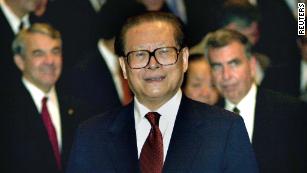Jiang Zemin, former president who helped China flourish, passes away at age 96.
State-run Xinhua news agency said on Wednesday that Jiang Zemin, the Chinese communist leader who laid the path for his nation to become a worldwide superpower, has passed away. He was 96 years old.
On Wednesday in Shanghai, the former leader of the nation's Communist Party and state president passed away from leukaemia and related multiple organ failure. His wife, two sons, and two grandchildren are still alive.
Jiang's passing occurs at a delicate time for China. China has recently experienced an unprecedented surge of anti-government "zero-Covid" protests, with some protesters in Shanghai demanding for the resignation of the country's president, Xi Jinping. People have a history of protesting in China's streets after the passing of former leaders and sharing their complaints.
Jiang is frequently credited with reintegrating China into the world after the West ostracised the country after the massacre in 1989's Tiananmen Square.
As a result of his leadership, China reclaimed control over Hong Kong, was chosen to host the 2008 Summer Olympics in Beijing, and possibly most significantly, it became a member of the World Trade Organization.
Robert Lawrence Kuhn, author of the 2005 biography "The Man Who Changed China: The Life and Legacy of Jiang Zemin," argued that integration was "arguably the major driver to the enormous growth spurts of double-digit growth for a decade or more."
"In relation to the economic trajectory that was created, it is without a doubt, in my opinion, that it was done at that time and that it became irreversible.
However, many observers also believe that Jiang's rule planted the roots of pervasive corruption, which continues to be a source of intense resentment today. He continued to place stress on one-party rule rather than political reform, praising the advantages of "everyone generating a fortune discreetly."
ICC t20 updates 🤔🤩 (click)
Jiang was initially seen as a transitional figure, but in 1989, when the bloody military crackdown on the pro-democracy movement across the country led to Zhao Ziyang's removal as party chief, Jiang was personally chosen by then-paramount leader Deng Xiaoping. Zhao Ziyang had been supportive of the protesters.
According to Pin Ho, the founder and CEO of the Mirror Media Group, a significant New York-based publisher of books and websites in Chinese, Jiang was a contradictory character and an accidental leader.
According to Pin Ho, the founder and CEO of the Mirror Media Group, a significant New York-based publisher of books and websites in the Chinese language about Chinese politics, Jiang was a contradictory figure and an accidental leader. He appreciated and admired the civilizations of the West, but he still had to function within the confines of the Chinese political system.
He continued, "He was not ready to develop into a thoughtful and visionary leader. By carrying out Deng's policies, he merely prolonged Deng's rule.
SAVAGE cat turnout 😳 (click)
These initiatives centred on economic liberalisation and globalisation, which increased living standards while also expanding the wealth disparity, and kept the party's iron hold over the political, ideological, and military spheres in the country with the largest population on the planet.
Smart politician
Jiang, a former party chief and mayor of Shanghai, the largest city in China, outwitted numerous political rivals and quickly consolidated power in the party and military, especially after Deng's passing in 1997. Despite this, many people had underestimated how cunning a politician he would be. He was the leader of the so-called "Shanghai clique," whose power prolonged his tenure in office, and he installed important allies and protégés all through party and the administration.
Jiang's willingness to accept private business owners—effectively capitalists—into the Communist Party was a revealing indication of his relative flexibility and openness. Jiang announced the party would officially accept entrepreneurs as its participants in 2001, the year before he stepped down as leader. This was a significant move that reenergized the party.
The government's relentless onslaught on the Falun Gong, a spiritual movement that Beijing deemed a vile cult, was another feature of his administration. Jiang had been pursued by the group's most ardent supporters around the world for "crimes against humanity," frequently following the Chinese president when he travelled abroad.
Jiang began transferring positions to Hu Jintao, his successor, beginning in late 2002, first as party chief and later as president. Even after his formal retirement, he continued to generate political influence from behind the scenes, even over the choice of Xi as leader. Xi recently began serving a record-breaking third term, laying the foundation for him to rule for life.
Since the death of Mao Zedong, Xi has been the People's Republic's most potent leader. Jiang's faction was one of his political adversaries. He has also restored the Communist Party's hegemony over all facets of Chinese society, significantly curtailing the personal and economic liberties enjoyed under Deng, Jiang, and Hu.
Gaining power
Jiang was trained as an electrical engineer after being raised in eastern China in 1926 and attending school in pre-communist Shanghai. He supposedly joined the party in his undergraduate years, and in the 1950s, he went to the former Soviet Union to study. He advanced steadily out through party ranks, becoming the electronics industry minister in 1983 before being elected Shanghai mayor two years later.
Life
In addition to being well-known for sporting bulky, black-rimmed glasses, Jiang was also well-known for his love of showcasing his artistic and linguistic prowes by performing "O Sole Mio" in Italian in front of foreign dignitaries and reciting Abraham Lincoln's Gettysburg Address in English.
In a one-on-one interview with CNN in May 1997, Jiang stated, "I feel that no matter what one's occupation, if one can enjoy reading some literature and enjoy some music, that may be very useful to the healthy evolution of the individual."




Comments
Post a Comment